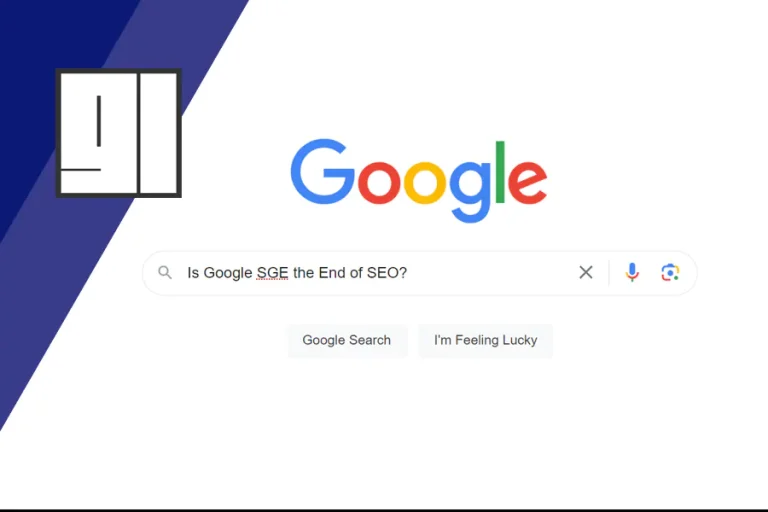25 Basic SEO Tips for Beginners in 2023
Are you overwhelmed by search engine optimization (SEO)? If there only was an easy-to-understand guide for navigating jargon and technicalities.
Well, in this article, I will share 25 beginner-friendly SEO tips to improve your website’s visibility in search engine results. I will take it step by step, and your site will rank higher and attract more organic traffic.
If you’re short on time, here’s a quick summary of the 8 most relevant tips for fast results
What Are the Basic SEO Tips for Beginners for Quick Results?
We’ve curated a list of 25 essential SEO tips out of countless possible optimizations. These tips will help you focus on the most critical aspects of SEO and provide a strong foundation for further improvements. Let’s dive into the full tutorial!
Keyword Research
Keyword research is the backbone of a successful SEO strategy. Tools like Ahrefs, Google Keyword Planner, SEMrush, or Keyword Tool can help you identify the best keywords for your content. Find relevant keywords by analyzing search volume, competition, and user intent.
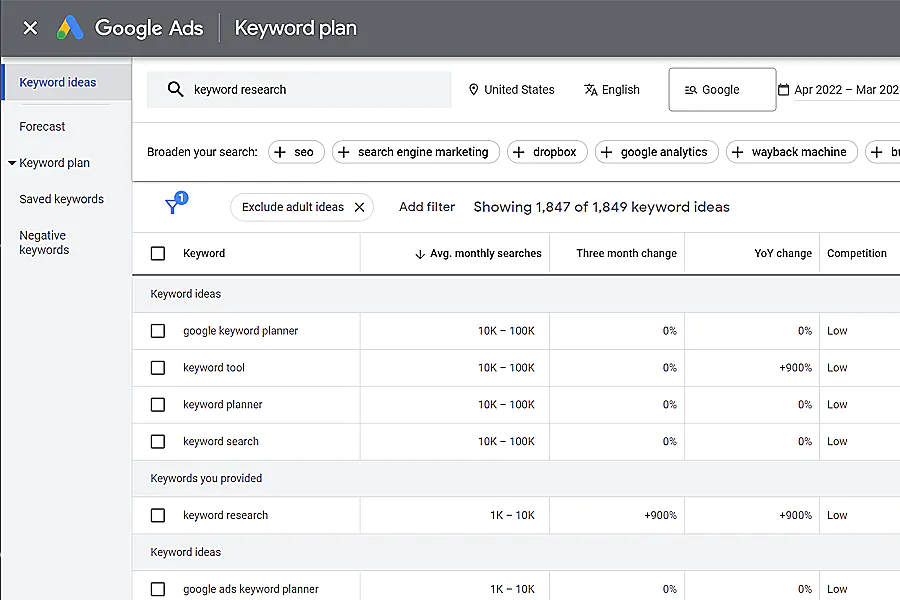
If you’re eager to learn more, I’ve crafted a comprehensive how-to guide specifically tailored for beginners. This resource breaks down the complexities of keyword research, equipping you with the knowledge and skills to optimize your website’s SEO and elevate your online presence to new heights.
Create High-Quality Content
High-quality, captivating, and shareable content is crucial for attracting and retaining users. Focus on providing value to your audience, addressing their pain points, and offering actionable solutions to their problems. Answer The Public is a great tool to get ideas, about what people are searching for or looking for.
Build Quality Backlinks
Backlinks from reputable websites can significantly improve your site’s credibility and authority in the eyes of search engines. Focus on building relationships with industry influencers, guest posting on authoritative sites, and creating shareable content to attract high-quality backlinks.
Optimize Page Titles
Craft unique, descriptive, and engaging titles for each page, incorporating your target keywords. Keep titles under 60 characters to ensure they display not truncated in search results, and remember that a captivating title can entice users to click on your page. This Google SERP Simulator by mangools.com lets you preview your page titles on desktop and mobile.
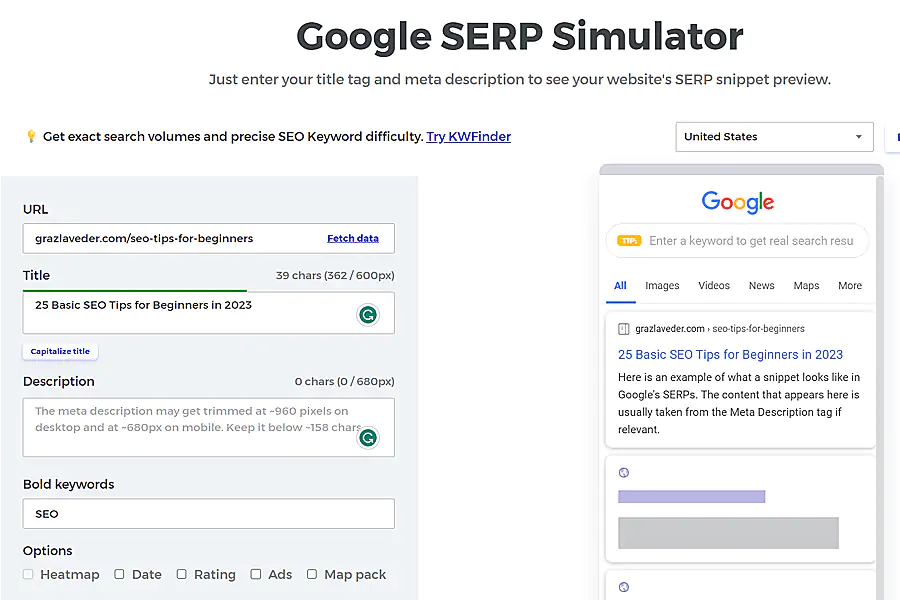
Meta Descriptions
Create compelling meta descriptions for each page summarizing the content and including your main keywords. Aim for 150-160 characters to avoid truncation in search results, and write in a way that encourages users to visit your site.
URL Structure
A clean, descriptive, and keyword-rich URL structure is vital for user experience and SEO. Steer clear of numbers, special characters, or generic terms like “page1”, and focus on creating URLs that convey the page’s content.
Mobile-Friendly Design
As more users access websites through mobile devices, ensuring your site is responsive and user-friendly on various screen sizes is crucial. Mobile-friendly sites are prioritized by Google in search results, so a responsive design can significantly impact your rankings.
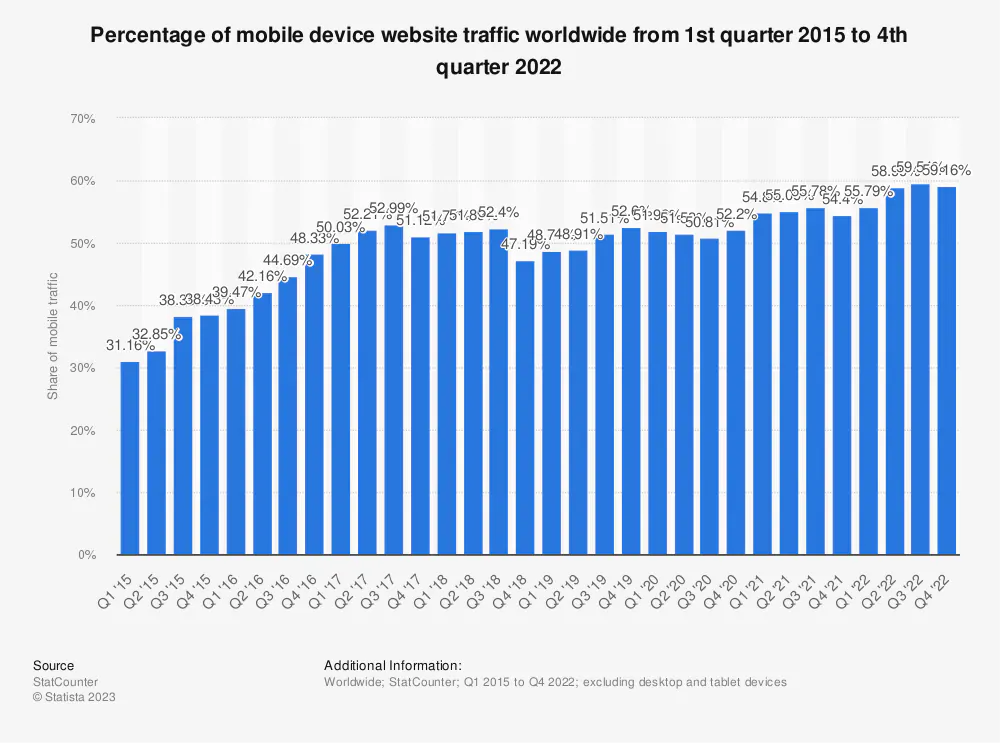
Page Load Speed
Optimize your site’s load time by compressing images, minimizing HTTP requests, and utilizing browser caching. Fast-loading sites rank higher in search results and provide a better user experience, which can lead to increased conversions. Google offers a free-to-use service called PageSpeed Insights where you test the speed of your website.

Internal Linking
Incorporate internal links throughout your content to help users navigate your site, enhance user engagement, and boost your site’s SEO value. Aim for a natural link flow that guides users to related content and promotes a seamless browsing experience.
Harness the Power of Header Tags
Header tags (H1, H2, H3) structure your content effectively and helps search engines understand its hierarchy. Incorporate keywords in these tags to emphasize the relevance and improve your content’s visibility in search results.
Simplify Site Navigation
An easy-to-navigate website with a well-structured sitemap helps users and search engines explore your content more effectively. A straightforward, intuitive navigation menu can boost user engagement and improve your site’s overall SEO performance.
Optimize Images for SEO
Shrink your images to minimize file size, and employ descriptive file names and alt tags to enhance SEO. Properly optimized images can improve page load speed and provide valuable context for search engines to understand your content better.
Implement Schema Markup
Schema markup is a form of structured data that helps search engines understand your content more accurately. With schema markup, you can offer supplementary details about your content and obtain rich snippets in search outcomes.
Encourage Social Sharing
Add social sharing buttons to your content, making it easy for users to share your articles or pages on their social media profiles. Social sharing can increase your content’s visibility, drive traffic, and indirectly impact your SEO.
Keep Content Fresh and Up-to-Date
Regularly updating and refreshing your content ensures it stays relevant and valuable to your audience. Search engines favor up-to-date content, so revisiting and optimizing older posts can improve your site’s overall search performance.
Fix Broken Links
Monitor your site for broken links and fix them promptly to avoid negative SEO impacts. Broken links can harm user experience and search engine crawlers’ ability to index your content, so addressing them as soon as possible is essential.
Track Performance with Google Tools
Set up Google Analytics and Search Console to monitor your site’s performance, identify issues, and uncover growth opportunities. These tools provide valuable insights into user behavior and search engine interactions with your site.
Submit Your Sitemap
Submitting your sitemap to Google and other search engines can improve the indexing of your site and ensure that your content is more quicker discoverable. A well-structured sitemap can also aid search engines in understanding your site’s organization and hierarchy.
Target Long-Tail Keywords
Long-tail keywords are more specific and often less competitive than broader search queries. By targeting long-tail keywords, you can create highly relevant content that appeals to a niche audience and achieves higher conversion rates.
Create and Maintain a Blog
A regularly updated blog can help you publish fresh, keyword-rich content that attracts organic traffic and improves your site’s SEO. Blogging can also position you as an authority in your niche, encouraging users to trust and engage with your brand.
Avoid Duplicate Content
Duplicate content can lead to search engine penalties and can confuse users. Always create unique, original content for your site and implement canonical tags when necessary to indicate the preferred version of a page.
Secure Your Site with HTTPS
HTTPS is a secure version of HTTP, ensuring data transmitted between a user’s browser and your site is encrypted. Search engines prioritize secure sites in search results, so implementing HTTPS can positively impact your rankings.
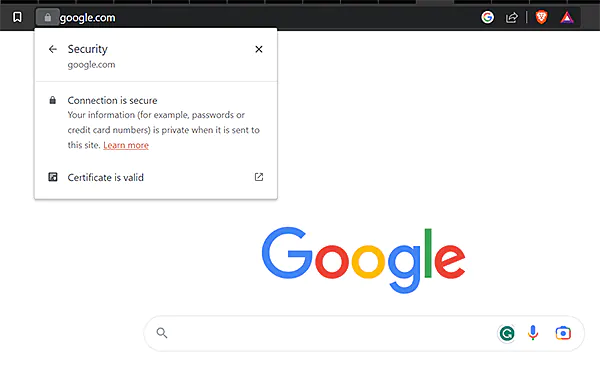
Local SEO for Targeted Results
If your business relies on local customers, implement local SEO strategies to target your audience effectively. Optimize your site for location-specific keywords, set up and maintain a Google My Business listing, and gather positive customer reviews.
Regularly Audit Your Site’s SEO Performance
Conduct regular SEO audits to identify areas for improvement and ensure your site remains optimized for search engine performance. Audits can uncover technical issues, content gaps, and growth opportunities. Ahrefs, SEMrush, or this free service Google Search Console can help you perform audits on your site.
Stay Up-to-Date with SEO Best Practices
The world of SEO is constantly evolving, with search engines frequently updating their algorithms. Stay informed about SEO best practices and industry developments to maintain your site’s ranking and adapt your strategy.
These sites might help you stay ahead the competition when it comes to SEO news and best practices:
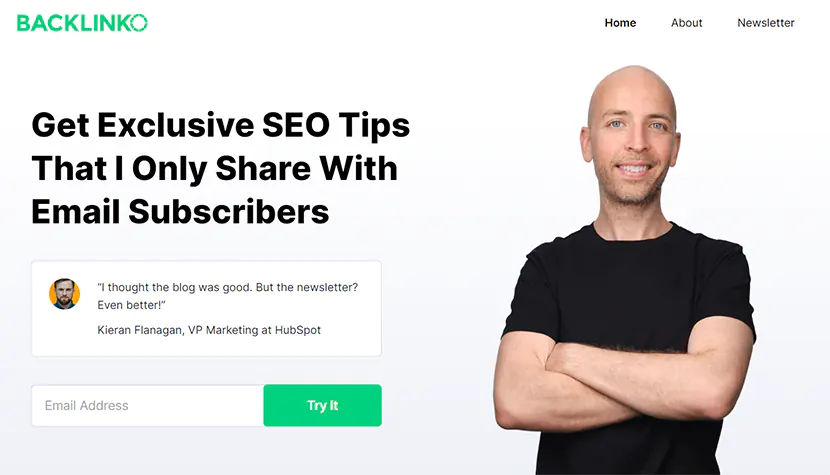
What Is SEO?
Search engine optimization (SEO) is refining your website to increase its visibility in search engine rankings. By implementing various on-page and off-page SEO techniques, you can boost your site’s chances of ranking higher for relevant keywords and drawing more organic traffic.
SEO comprises various factors, such as content quality, site structure, and link building, which improve your website’s visibility. Search engines, like Google or Bing, use complex algorithms to determine how to rank websites for specific search queries. By understanding and adapting to these algorithms, you can optimize your site to meet search engine expectations and rank higher in search results.
How Can SEO Benefit You?
In addition to the numerous benefits already mentioned, such as increased visibility and higher organic traffic, SEO can also help establish your brand’s credibility and authority. When your website ranks highly in search engine results, users are more likely to trust your brand and view your site as a reliable source of information.
Moreover, SEO can lead to better user engagement, as optimizing your site often involves improving its design, functionality, and content quality. This, in turn, can result in lower bounce rates and higher time spent on your site, which are all factors that search engines consider when ranking websites.
FAQ: SEO Tips for Beginners

Final Thoughts
Embarking on your SEO journey may initially feel daunting, but armed with these 25 beginner-friendly tips, you’ll be well-equipped to enhance your website’s search engine performance. Remember, SEO is an ongoing process that requires regular updates and assessments to stay ahead of the competition and maintain your site’s rankings.
If I had to recommend the top 5 SEO tips for beginners that would rapidly boost your Domain Ranking (DR), my focus would be on Quality Content and Backlinks. Yes, you read that correctly – Quality Content and Backlinks! These two factors are so crucial that they deserve multiple mentions in our list of SEO tips for beginners.
Additionally, staying informed about industry trends and search engine algorithm updates is crucial to adapting your strategy and ensuring your website’s success. By dedicating time and effort to SEO, you can enjoy long-term benefits and a more substantial online presence for your business.

Graz is a tech enthusiast with over 15 years of experience in the software industry, specializing in AI and software. With roles ranging from Coder to Product Manager, Graz has honed his skills in making complex concepts easy to understand. Graz shares his insights on AI trends and software reviews through his blog and social media.



